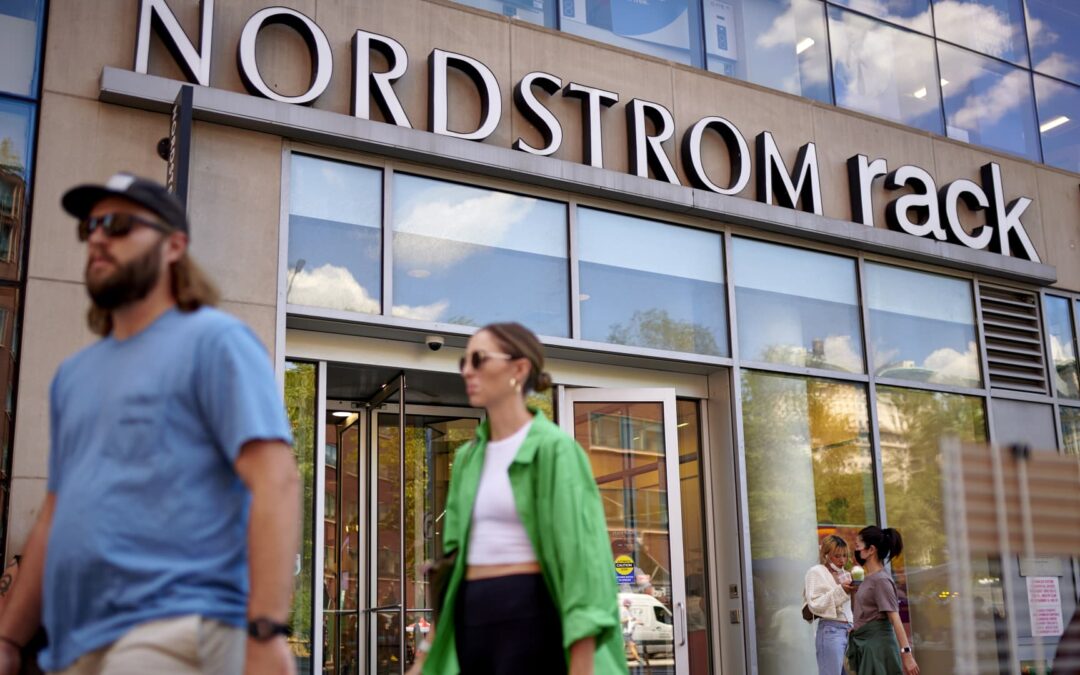Nordstrom on Tuesday posted earnings that blew past Wall Street’s expectations, indicating the department store is making strides in its efforts to cut costs and boost efficiencies.
Though the Seattle-based retailer posted earnings per share that were 25 cents higher than expected, it issued tepid guidance for the full year.
Nordstrom now expects adjusted earnings per share to be between $1.75 and $2.05, compared to a previous range of $1.65 to $2.05. It anticipates sales will be in a range of a 1% decline to 1% growth from the prior year, compared to previous guidance of down 2% to up 1%.
In a news release, Nordstrom CEO Erik Nordstrom said the company is optimistic about the second half of the year despite the cautious guidance.
“Our second quarter results were solid, and we’re encouraged by the continued topline strength in both banners and the progress we’re making to expand gross margin and increase profitability,” said Nordstrom. “We’re confident in our outlook for the remainder of the year and look forward to sustaining the momentum we’ve built.”
Shares rose about 5% in extended trading.
Here is how the department store did in its second fiscal quarter compared to what Wall Street was anticipating, based on a survey of analysts by LSEG:
- Earnings per share: 96 cents adjusted vs. 71 cents expected
- Revenue: $3.89 billion vs. $3.90 billion expected
The company’s reported net income for the three-month period that ended Aug. 3 was $122 million, or 72 cents per share, compared to $137 million, or 84 cents per share, a year earlier. Excluding one-time items related to supply chain impairments, the retailer posted adjusted earnings of 96 cents per share.
Sales rose to $3.89 billion, up about 3.4% from $3.77 billion a year earlier. Revenue came in just shy of analysts’ expectations.
Across the company, comparable sales increased 1.9%, while gross merchandise value jumped 3.5%. It is unclear how much of that GMV uptick was related to price increases versus volume.
As consumers continue to pull back on discretionary spending in the face of persistent inflation and high interest rates, retailers have been working to improve operations and cut costs to protect profits against softening demand.
During the quarter, Nordstrom’s profits fell compared to the same period a year ago, but earnings grew over the past six months. Last year, Nordstrom reported a net loss of $67 million in the six months that ended July 29, 2023, but during the same period this year, it posted a profit of $83 million.
Nordstrom has said it is working to improve its supply chain. Last quarter, it said the time it takes for online orders to arrive was more than 5% faster. It has also improved the way merchandise is making its way to customers and stores, which it said has helped drive higher conversion and lower return rates.
Another key focus area for the company has been growing its off-price banner, Nordstrom Rack. Over the past couple of quarters, momentum has been growing at Nordstrom Rack and has helped prop up the company’s overall results. During the quarter, sales at Nordstrom Rack were up 8.8%, while comparable sales increased 4.1% compared to the same period a year ago.
That compares to Nordstrom’s mainline banner, which saw net sales and comparable sales each increase just 0.9%.
Nordstrom has been working to build more Rack locations and has opened 11 new locations so far this fiscal year, with a goal of opening at least 22 by the end of the year. The focus on Rack has been critical for Nordstrom’s ability to compete with off-price giant TJX Cos., the owner of TJ Maxx and Marshall’s, and capture consumers who are still spending but eager for cheaper options and deals.
The off-price sector has seen explosive growth for more than a year, but Rack missed out on the beginning of that trend. To reverse the slump, the company has focused on opening more locations, hiring off-price veterans and sharpening its focus on well-known brands.









